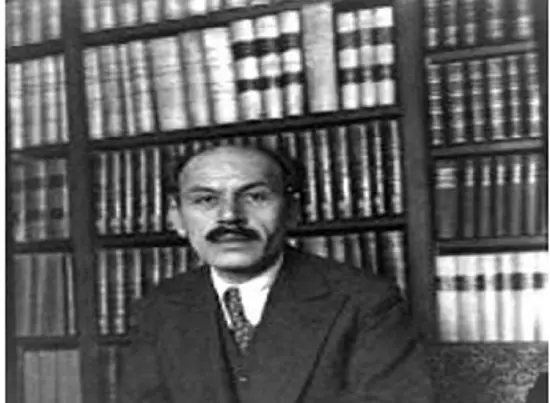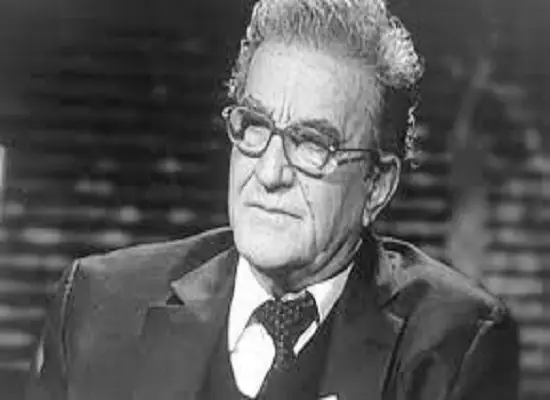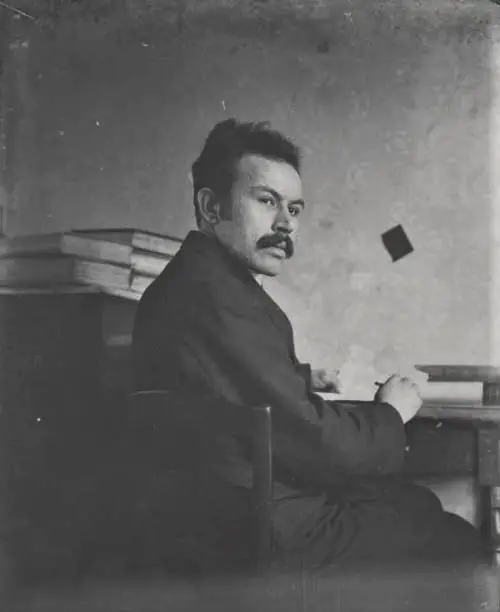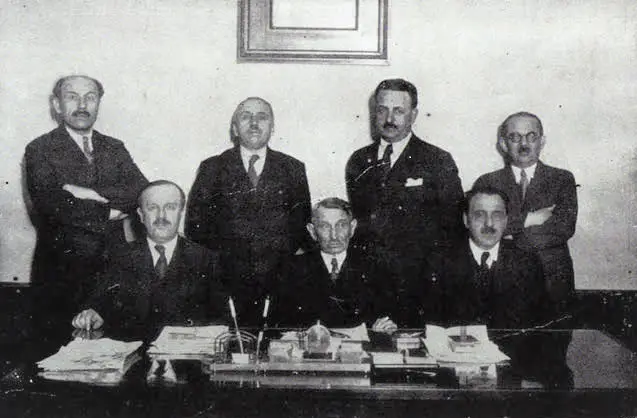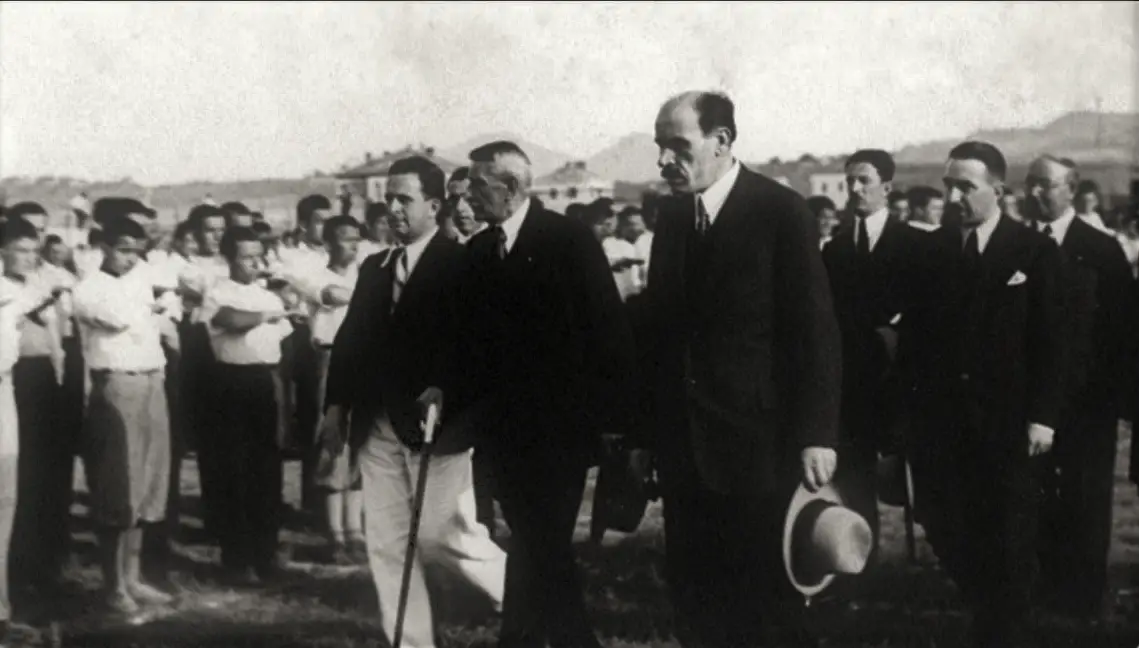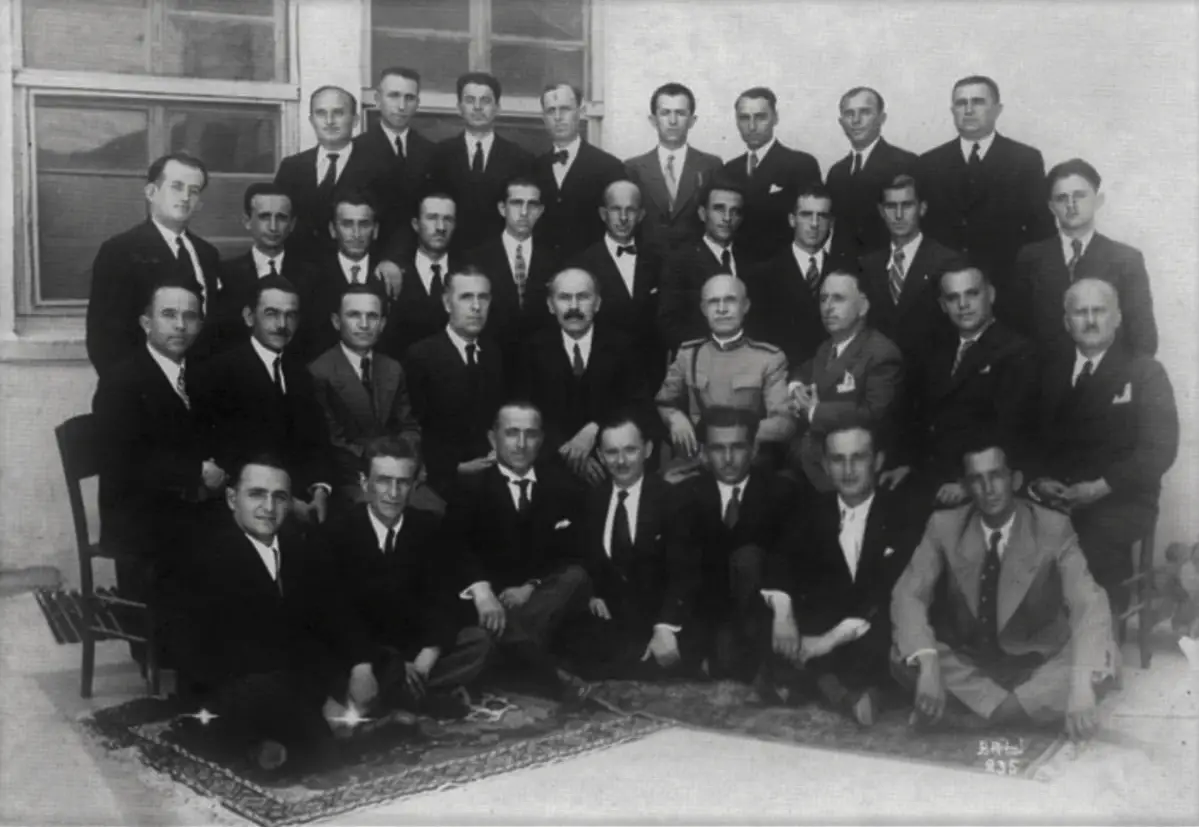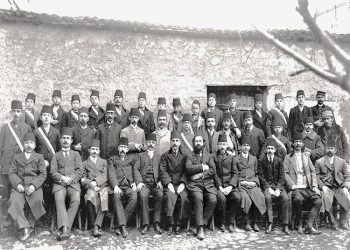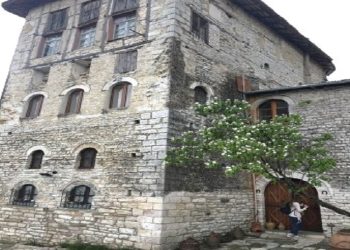By Dr. Uran Butka
The third part
Memorie.al / Mirash Ivanaj, is an extraordinary personality, among the few chosen people, to strongly express himself, the cultural elite and the Albanian nation. A polyhedral figure: patriotic leader, giant of Albanian thought and action in the 1930s-’40s of the last century, creator and reformer of national education, model statesman, one of the most knowledgeable intellectuals of the time, researcher, poet, publicist, chronicler, translator, unbroken opponent of the fascist occupation of Albania and the communist dictatorship, martyr of the nation. He left his homeland together with his brother Martin Ivanaj, a prominent jurist, president of the Dictation Court, as well as his friends, the architect Qemal Butka and the philosopher Branko Merxhani, as a rejection of the Italian occupation of Albania and as a rescue for their lives. He himself explains this exile in the extraordinary diary “We, who found salvation in running away”, after the anti-Italian civil and student protests, which Mirashi also supported.
Continues from last issue
Tirana, on April 2, 1949
ACT – ACCUSATION
As will be ascertained from the attached minutes, the defendant Mirash Ivanaj, son of Doda and Zoga, 57 years old, born in Titograd, accused:
As the minister of Zog’s regime, he tries to keep this regime strong in every way, trying to disorient the anti-Zogist elements through reforms decreed only on paper. The ability and loyalty to Zog’s anti-popular regime led him to become the head of the Council of State until April 1939.
During the days of the occupation, he escaped to Greece with the clique and from there to Turkey, where he lives being supplied by foreign agents, such as the Englishman Sterling, etc. For the purposes of Anglo-American imperialism, it forms committees in Jerusalem and other places. In 1945, under the orders of the Anglo-Americans, he returned to Albania to counter popular power, recommended by foreign agencies for the elements he would cooperate with, he got in touch with Kostë Boshnjak, Ali Baki, Gjergj Kokosh, etc., and together with raises the issue of organization and the path that had to be followed to overthrow popular power.
Everywhere he propagates among known elements, which he tries to throw into activity against popular power. It is aware of the existence of the organization of traitorous deputies and supports their terrorist program.
…Military Prosecutor’s Office
Chap. II Petrit Hakani d.v.
The indictment was read to him and he said he did not accept it.
“During the time of Zogu, I was the director of the Lyceum of Shkodra and at the beginning of 1933; I became the Minister of Education, later the chairman of the State Council until 1939, when I went abroad. I was an admirer of the Bird, as was everyone else. There was no political party in Zog’s time, but I supported elements with democratic tendencies. I have not been against Zogu.
The State Council did not have any political power, but was only there to express opinions. I ran away with Zog’s chariot because we were told that we would be organized in Korça. I ran away without taking anything, I ran away like you see me today. I was loyal to Zog until April 7, 1939. During the time I was outside, I stayed in and, later, together with Qemal Butka, we went to Jerusalem…!
We did not form any organization in Istanbul, because the Turkish government did not allow it. We made several political acts and meetings when the Italo-Greek war started and we made a protest regarding Churchill’s speech, as well as another time against Greece, when he demanded our lands of Korça and Gjirokastra.
We have done these with the consent of the government itself. Turkey has not yet recognized the occupation of Albania and Hasan Xhaxhilli was the minister in Turkey. We used to meet him once a year, when it was the 28th of November…! The minister had no power over us. I was kept by the Albanian colony for 7 years…! I have not participated in any committee. I would participate in the committee, in case it was legal and not illegal. I met Zogu once in Istanbul and he told me that a committee would be formed, where Koço Kota and I would be.
I told him that I do not cooperate with Kotten. That’s how I broke up and I haven’t met him again. I have had no correspondence with Zogu. I was an isolated person. When Stërling proposed to make the independence of Albania, I did not accept that there were people like Musa Juka in it and that this committee could not really work for the independence of Albania. I don’t know the Englishman you accuse me of. I went out without knowing I was going out. I came to Albania because Albania was liberated. My idea is to work in education.
After coming to Albania I am without many people. I saw Gjergj Kokoshi, Ali Baki and other teachers. As far as the situation in Albania is concerned, there have been no major changes. I have not talked to any person politically. I talked with Gjergj Kokoshin once in the hotel and that was before the elections; he told me that he wanted to form a legal opposition and that he would present his candidacy for deputy in his personal name, not in the name of the Democratic Front.
I have known Kolë Kuqali since an American minister came after him, in 1938. After the liberation of Albania, I have never met him. I only met with Kostë Boshnjak once to get some money with a bill of exchange, to mortgage their house, but he refused. He asked me about some groceries and I told him their prices. About the existence of the organization of traitorous deputies, I have no knowledge. I have never appeared at the American Mission in Albania…”!
Although Mirash Ivanaj does not accept the charges and rejects them one by one with arguments and facts, the Military Court headed by Abdyl Haki called the charges and facts fully proven and based on Article 3, paragraph 8, and Article 8, of the infamous law 372 dated 12.12.1949, sentenced him “for crimes against the state”, to seven years in prison and another five years of loss of political rights, as well as confiscation of movable property. He also charged the court costs!
When the decision was given, Mirash Ivanaj was haunted and indifferent to the point of oblivion. Prosecutor Hakani, when he noticed, said:
– Did you hear, brother?
– No sir, what do I know?
– You were sentenced to seven years in prison!
– What am I convicted for, sir?
– For agitation and propaganda, against popular power!
– As for me, since I came from Turkey, I have not spoken to anyone except for teaching work.
– With that thought you came to make propaganda!
– Is there a law in the world, sir – replies Ivanaj – to punish the thought?
– Shut up because you are condemned!
There was such a country where the thought was punished and this was the Albania of that time.
Convicted Mirash Ivanaj, appealed the decision of the Garrison Court of Tirana, with these words that constitute a sharp irony: “In case the fact that is attributed to me is considered guilt, I declare that I did not have any bad intentions and I ask the court to judge that, in the review of my case, you show generosity, you saw my economic situation completely torn apart and the bad state of health and, transfer the sentence to the conditional, you thus gave me the opportunity that the last days of my old age, I dedicate, with the contribution I can, to the people…”! Mirash Ivanaj, 10.4.1948.
Even the Supreme Military Court headed by Niko Çeta, which has convicted a large part of intellectuals and, in the presence of the chief criminal, military prosecutor Nevzat Haznedari, approved the decision of the Military Court of Tirana, for the punishment of Mirash Ivanaj. This decision was final!
This is how the great personality of Albanian education and culture, the democrat Mirash Ivanaj, was locked up in communist prisons. His sufferings in prison are endless, as for all other political prisoners. However, they became more serious and sadder for Mirash Ivanaj, because of his proud character and because there was no one to take care of him, except the old woman Novkë – the former Montenegrin servant – who brought him, whenever she could, a handful of tobacco, or any food, which the grandfather shared with other prisoners.
At this time, the crafts prison was created where those prisoners who had skills in foreign languages were also entered. The totalitarian state needed translations in all fields, so it put intellectuals who knew the languages of the West and the East, such as Mitrush Kutelin, Jusuf Vrionin, Mit’hat Aranitin, Gjergj Bubanin, Lazër Radin, into the huge pile of forced translations. , Beqir Haçin, Mihal Sherkon, Reis Hashon, etc.
Mirash Ivanaj also translated there day and night under strict control. He mainly translated literature, from the fields of mathematics, military, philosophy, history, etc. As the persecuted Sabri Çelnikasi testifies, the majority of prominent intellectuals were in the translation room. They loved and helped each other. Then they were locked up in Burrell prison as dangerous.
Mirashi was generally thoughtful and had a constant worry in his soul about the black fate of Albania, which, according to one of his expressions, had been put on the downward path, towards the political, economic and moral precipice that would soon lead him in complete disaster. Also, his soul wept for his library, for the books, which were like his only children and which had been stolen from him.
In their absence, in the time he had free time, he taught the prisoners foreign languages, especially the younger ones. While at the time of forced labor, especially in the quiet night, he translated and translated, often freezing cold from the humidity, from the cold and lack of movement and with fingers that creaked, he wrote and wrote as much as he could, in order to completed in time the translations that remained forever anonymous.
“Even when he was in better health – writes Mitrush Kuteli, – he did not like to go out into the prison yard and behave like a horse in the plow. The people (prisoners) looked to him like those fish out of water that, in agony, tear open their mouths to eagerly inhale some oxygen…”!
Kolosin Mirash Ivanaj, you never knew if he was eaten or not, happy or sad. His voice was never heard. When his fellow sufferers begged him to take some of the food that his family members brought, he never accepted. Professor Beqir Haçi tells that when he cut an orange into pieces, he offered it to Mirashi first, but he, thanking him, did not take it. After they all took from one core, the last one remained. Only then, when everyone had taken it, Mirashi also took it out of courtesy.
One day, in the house of suffering, according to the memories of Jakov Miles, Mehmet Shehu came with Bedri Spahiu. In the translation room, they also met Mirash Ivanaj. The old man respectfully stood up:
“I believe that during your time in prison you will have revised your views” – said Bedri Spahiu.
“Not my views, but my beliefs” – corrected Mirashi. – “to tell you the truth: I haven’t changed any”.
“Then you were none other than a dotard old man”, Mehmet Shehu vented.
“I am a thinker and a democrat who even if I were to go back in life, I would follow the same path.”
This is how the martyr Mirash Ivanaj spent his last days, in torture and in exhausting forced labor: with insults and humiliations, with a complete lack of sun and freedom, with a lack of minimal food to sustain his soul, wasted to the limits of human misery. He fell ill, as they said, from a entanglement of the bowels, and went into that deathly agony. They formally took him to the prison hospital.
According to the confession of Agron Çarçan, who was in a room in the prison hospital, Ivanaj also suffered from tuberculosis which had torn his lungs to pieces and he could not put anything in his mouth. However, he never complained, never whined, never asked anyone for help. His apotheosis, which goes up to God, is found in the poem of the evening, in the poem of the prison:
“Oh God, how long do you endure these sins,
Who do the works created by you?
Who rules, tell me, these or you”?!
Like other prisoners before and after him, Mirash Ivanaj was allowed to die without any surgical intervention. The red rulers were interested in him not seeing the light of the sun and life again. The alibi of a natural death at the hospital was the best alternative to a disappearance without a trace. Enver Hoxha’s diabolical perverse and vengeful spirit would be satisfied and appeased with the death of Mirash Ivanaj.
In the last moments, they brought Doctor Shiroka, who was shocked beyond measure when he saw the professor dying. He closed his eyes forever, to save himself from all the suffering and indignities of this sick world, 12 days before he fulfilled his sentence, that is, 12 days before he was released, Ivanaj died!
“He died: neither in prison, nor at home, neither free nor imprisoned, neither among people nor alone at all, an absurd death, a mysterious death; died martyred but unyielding and in a cruel silence”
Fellow sufferer Ibrahim Hasnai, as well as former hospital laboratory technician Enis Boletini, says that the hospital found out that Mirash Ivanaj’s body was in the Anatomy auditorium of the Faculty of Medicine, for an experiment and teaching demonstration. Thus he served Albania even to death.
Ten years later in 1963, when Nikolla Ivanaj’s relatives took him out of the place where they had thrown him, to bury him humanely in the Sharra cemetery, they found him thrown in a pit without a name, without a coffin, upside down face down, like a prisoner, who is condemned again after death.
But time and the people who understand him, turned his face from heaven and someday will put him in his deserved place, in the Pantheon of the Nation, the martyr Mirash Ivanaj. Memorie.al




